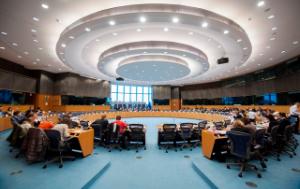Highlights
Upcoming broadcasts
13-17 January: Committees and Political Groups
In the week of 13 January, Members' work is split between meetings in Parliamentary Committees and political groups.
Some of the highlights this week include an exchange of views between the Members of the AFET committee and the Commissioner for Enlargement, Marta Kos; another exchange of views organised by the SEDE and AFET committees with NATO Secretary General, Mark Rutte and a Public hearing by the FISC committee on the impact of taxation on gender equality in the European Union.
- Foreign Affairs: Exchange of views with Marta Kos, Commissioner for Enlargement
- Security and Defence: Exchange of views with NATO Secretary General, Mark Rutte
- International Trade: Mercosur exchange with Šefčovič and vote on Moldova Facility
- Economic and Monetary Affairs: Public Hearing on the future of the Capital Markets Union (CMU)
- Tax Matters: The Impact of Taxation on Gender Equality in the EU
- Employment and Social Affairs: EMPL exchange of views with Enrico Letta
- Agriculture and Rural Development: Exchanges on topical issues

The European Parliament’s calendar for 2025 is available through the link below. Parliament decides its annual calendar of work on the basis of a proposal by the Conference of Presidents. It is divided into plenary sittings (part-sessions) and meetings.

The Fact Sheets on the EU provide an overview of European integration and of Parliament's contribution to that process. They present a brief summary of the EU's institutions and policies, and of Parliament's role in their development. Available in 24 languages, they cover five main areas: how the EU works; economy, science and quality of life; cohesion, growth and jobs; fundamental rights, security and justice; and the EU's external relations. The online version is updated regularly.

Parliament's committees deal with EU legislative proposals by adopting reports, which then are referred to plenary for voting by all Members, and appoint negotiation teams to conduct talks with Council. They adopt non-legislative reports, organise hearings with experts and scrutinise other EU bodies and institutions. Parliament can set up sub-committees and special committees to deal with specific issues. Each committee elects a chair and up to four vice-chairs for a two and a half year mandate.
